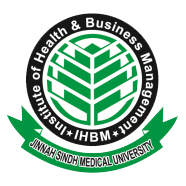Message
Founded in the early 18th century by fishermen along the coast of the Arabian Sea, the small fishing community called Karachi has grown to become the seventh most populous city in the world. Karachi’s growth started after its annexation by the British in 1843 when it was named the capital of the province of Sindh. Soon a cantonment was established, the fishing harbor started to develop into a seaport, and the Manora Island rose in strategic importance. As businesses grew and population increased, public buildings began to be constructed. The town hall named Frere Hall opened its doors in 1865. It was around the same time that the army barracks housing today’s Jinnah Sindh Medical University were set up roughly two kilometers away from the new town hall.
In the 1930s, the British turned these barracks into the Medical Corps hospital later called the British General Hospital from 1942 to 1947. After the Independence, the facility was renamed Jinnah Central Hospital in honour of the founder of the nation, who allowed the use of his name on the condition that the hospital shall be open to the people.
Jinnah Central Hospital became a postgraduate training institute in 1963. In 1973, Sindh Medical College (SMC) was started in the paediatric ward of the hospital. The new College began working with three departments initially. A separate building was constructed later, and three more departments and an administration block was added.
After graduating more than 13,000 students in 34 batches since 1978, SMC became the structural support for Jinnah Sindh Medical University (JSMU), which came into being on June 1, 2012. Since then, the University has experienced rapid growth and achieved several milestones in a short time. Today, JSMU has ten full-fledged constituent institutes and ten affiliated colleges. The total enrolment of medical and dental students exceeds 7,000, making it the largest medical university in Sindh. Various new academic programs have been introduced and teaching methods and facilities have been modernized to match medical education standards worldwide
Prestigious national institutions like the Jinnah Postgraduate Medical Centre (JPMC), National Institute of Cardiovascular Diseases (NICVD) and National Institute of Child Health (NICH) are the affiliated teaching institutes of the University. New constituents like the Institute of Pharmaceutical Sciences, APPNA Institute of Public Health, Institute of Health and Business Management, Sindh Institute of Oral Health Sciences, College of Nursing, Institute of Medical Education, Institute of Physical Therapy and Rehabilitation, Institute of Family Medicine and Institute of Medical Technology have been established.
The University’s teaching and research activities are based on the community model of engagement. JSMU has a mission to improve the quality of life and wellbeing of the communities within which it works. Its research and community engagement activities focus on effective solutions to problems faced by the people it serves.
Jinnah Sindh Medical University is counted among the signature institutions of the city of Karachi and the province of Sindh. It is a proud part of the age-old traditions of learning and erudition that set the province of Sindh apart.


